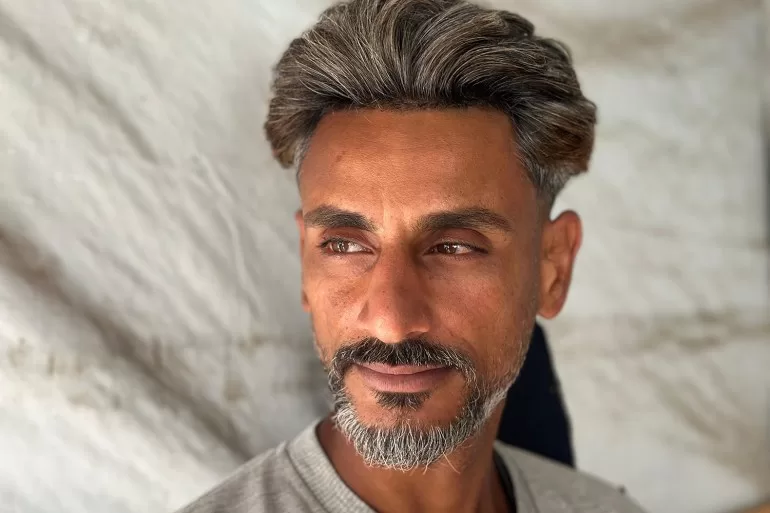Until this morning, 38-year-old Hussam Abu Ghaban had not heard of the Israeli Knesset’s decision to ban the UN agency responsible for his family’s welfare.
Now, with the Israeli Knesset passing two bills banning the agency from Israel and choking off its ability to work in Gaza, the family does not know what to do.
Someone in the nearby camp operated by the UN Relief and Works Agency (UNRWA) had mentioned it, but Abu Ghaban had not known about what turned out to be an overwhelming Knesset vote in favour of the ban despite international outrage.
‘People would go hungry’
The concern on Abu Ghaban’s face was unavoidable as he weighed the news. He, his wife Ola and their eight children had fled Shati refugee camp in the north of the Gaza Strip in early November to the relatively safe vicinity of a camp at Deir el-Balah maintained by UNRWA.
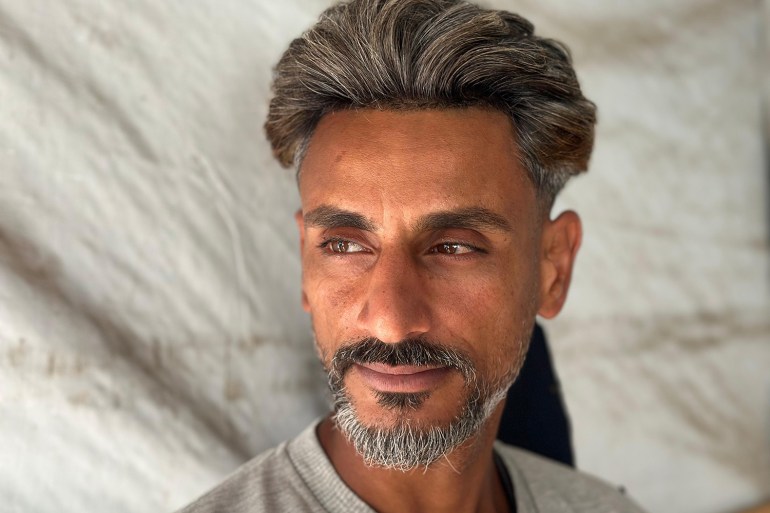
Overcrowded and painfully under-resourced as the camp is, it represents some small support to the 1.9 million displaced people in Gaza.
“UNRWA ‘s support has been crucial,” Abu Ghaban told a translator.
“They provide essential services such as health, education and food, as well as managing the camp,” he said, outlining how the family of 10, reduced to living in a tent, relied upon the UN agency for the dwindling number of essentials that make it through the Israeli checkpoints.
Abu Ghaban did not know how the family would survive without the support the UN agency has given generations of them since they were uprooted from their village of Hiribya to make way for the new state of Israel in the 1948 Nakba (catastrophe).
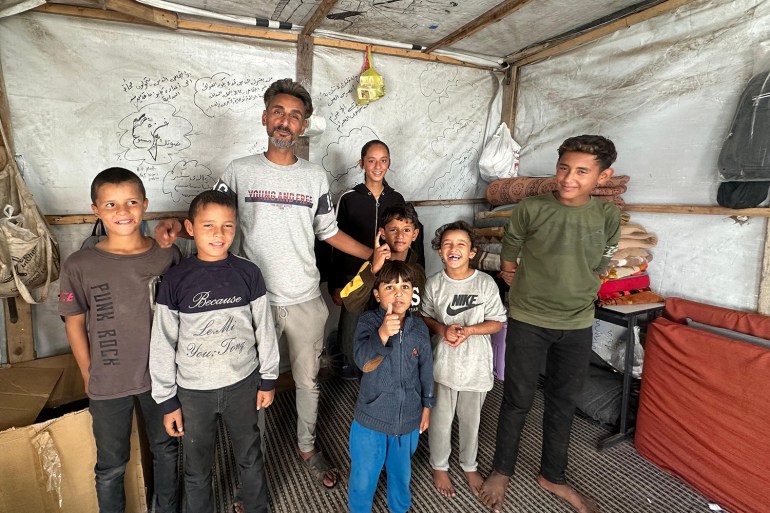
Since then, barred by Israel from returning, their displacement has become generational.
Abu Ghaban struggled to imagine life under Israel’s brutal assaults on Gaza without the support of the UN.
“Refugees would struggle to survive,” he said. “People would go hungry, and that could lead to increased violence,” he said of an enclave he described as already gripped by hunger, fear and instability.
Life is already difficult, he said. There had not been space in the official camp when they arrived. Now they exist on its periphery, though still under the care of the UN.
Abu Ghaban pointed to the plastic sheet UNRWA had provided to cover their tent. He still had nothing to make the rough dirt floor safe for his children, the youngest just six.
Life in Deir el-Balah is hard enough for the young, Abu Ghaban explained. “They’re now forced to focus just on survival, but I can see they still remember their previous life. UNRWA’s recreational activities help ease some of the strain.
“The children still express their hopes through drawing,” he said, pointing to the rough childlike sketch on the tent’s wall of a family going home.
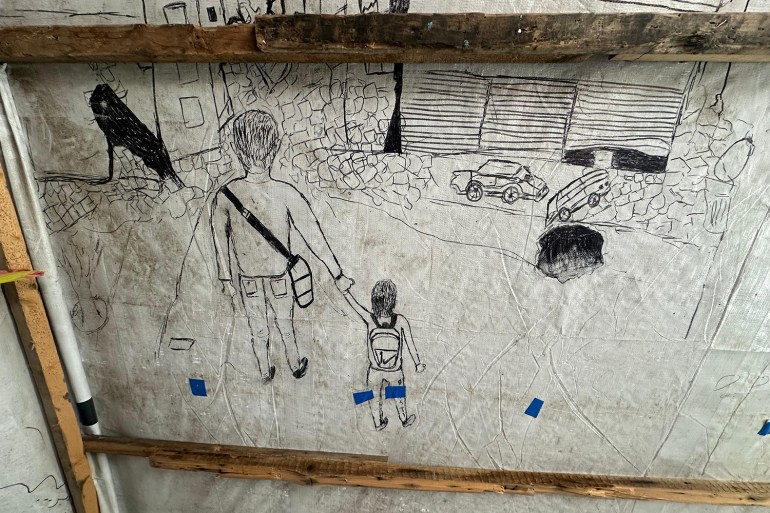
The impotence of aid
The legislation that may well stop much of the aid provided to the Abu Ghaban family will become law 90 days after Israel’s foreign minister informs the UN.
Moreover, with no alternative humanitarian agency earmarked in the legislation to replace the UNRWA, the consequences for those trapped in Gaza stand to be catastrophic.
Within the enclave, UNRWA acts as what its spokesperson Jonathan Fowler described as the “backbone” of the international humanitarian operation in Gaza.
Without UNRWA, that aid operation in Gaza would unravel, he said.
In Gaza, the situation has never been more desperate. In the northern reaches, with access strictly controlled by the Israeli military, famine looms over everyone as international concerns over a siege of the area, denied by the Israeli government, continue to grow.
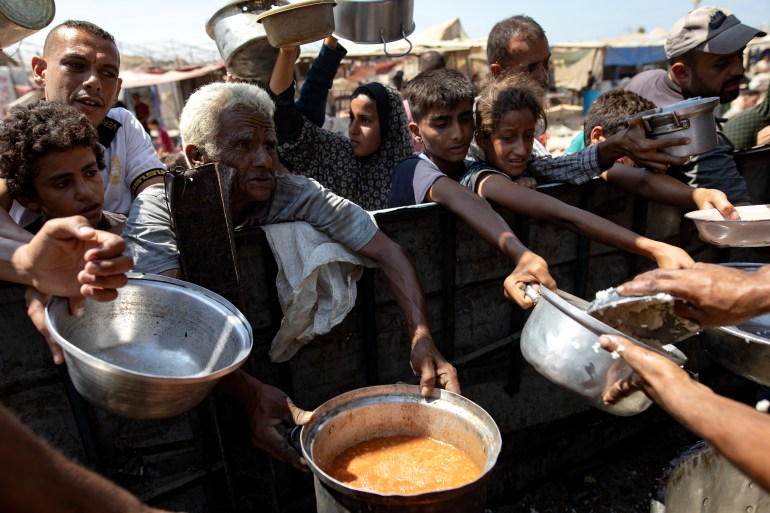
Should UNRWA’s ability to operate within the territory be halted, the delivery of the limited assistance that still penetrates parts of Gaza would also grind to a halt, Fowler told Al Jazeera.
“Such a move by a UN member state against a UN General Assembly-mandated organisation is unprecedented and dangerous,” Fowler said.
“It … violates the State of Israel’s obligations under international law… [and it] would be a setback to sustainable peace efforts and to reaching a diplomatic solution to the decades-long Israeli-Palestinian conflict,” he added.
“Failing to push back against attempts to intimidate and undermine the United Nations in the occupied Palestinian territory will eventually compromise humanitarian and human rights work worldwide.”
The politics of hunger
Israel’s longstanding campaign against UNRWA has escalated during Israel’s war on Gaza and includes a list of as yet unevidenced accusations of supporting Hamas’s fighters.
Throughout, UNWRA has strained to work on the ground in Gaza to help mitigate the effects of an Israeli military campaign deemed by the International Court of Justice in its January ruling a potential case of genocide.
Nevertheless, in the face of international pressure, unparallelled during the 13 months of total war on Gaza, the Israeli Knesset voted overwhelmingly to ban the agency, potentially collapsing the entire fragile network of aid that has so far managed to sustain what remains of Gaza’s population.
Even Israel’s closest ally the United States has recognised the seriousness of the situation. Speaking earlier this week, a State Department official acknowledged both the dire humanitarian situation in Gaza, especially its north, and UNRWA’s role in mitigating it.
One of the drafters of Israel’s legislation banning UNRWA, Yulia Malinovsky, dismissed the concerns of the US, which has provided Israel with unflinching diplomatic cover and weaponry throughout its war on Gaza, as representing unacceptable interference in Israel’s internal affairs.

“I congratulate and thank the members of the Knesset from across the political spectrum for passing the laws that tonight put an end to the ongoing disgrace of cooperation with UNRWA,” far-right provocateur and National Security Minister Itamar Ben-Gvir said.
“Whoever harms the security of the State of Israel, the State of Israel will harm him,” he added.
“This law wasn’t just popular within Israel – that it would pass was regarded as a simple fact,” Tel Aviv-based analyst Ori Goldberg told Al Jazeera.
“It was obvious. This unites official and unofficial Israel in their complete indifference to the plight of Palestinians.”
Goldberg continued, describing the motivations underlying the legislation as more sinister than what he termed the “hatred” of Israel’s settler movement that sought to dispossess and even kill Palestinians.
“This is far worse,” he said, “This is indifference. Israel simply doesn’t care about Palestinians.”
Speaking of the Knesset’s defiance in the face of international calls for restraint, Goldberg said: “We’ve taken a step closer to Israel’s ultimate aim, to achieve complete impunity for whatever it wants to do, whenever it wants to do it, free from the international community.”
